Picture this: you’ve invested in dental implants to restore your smile and confidence, but suddenly you notice something feels different. Maybe there’s discomfort, looseness, or visible damage to your implant or crown. If you’re experiencing issues with your dental implant in New Jersey, you’re not alone – and more importantly, you have options.
While dental implants have a success rate of over 95%, they may require maintenance and repair over time. Understanding when and how to address these issues can save your investment and protect your oral health. In this comprehensive guide, I’ll walk you through everything you need to know about dental implant repairs NJ, from identifying problems to finding the right specialist for your needs.
Key Takeaways
- Early intervention is crucial – addressing implant issues promptly can often prevent complete implant failure and save you time and money
- Multiple repair options exist – from simple crown replacements to complex bone grafting procedures, most implant problems have solutions
- Choose experienced specialists – working with a skilled and experienced dentist in NJ who specializes in implant restoration significantly improves your outcomes
- Prevention is key – proper oral hygiene and regular dental visits can prevent many implant complications
- Cost varies widely – repair costs depend on the complexity of the issue, but addressing problems early is typically more affordable than replacement
Understanding Dental Implant Components and Common Issues
What Makes Up a Dental Implant System?
Before diving into dental implant repairs NJ, it’s essential to understand the three main components of a dental implant system:
- The Implant Post 🦴 – A titanium screw that serves as the artificial tooth root
- The Abutment 🔗 – A connector piece that attaches to the implant post
- The Crown 👑 – The visible tooth replacement that sits on top
Each component can experience different types of problems, requiring specific repair approaches. The actual implant (titanium post) rarely fails, but when it does, it typically requires complete replacement.
Common Signs Your Implant Needs Repair
Recognizing early warning signs can prevent minor issues from becoming major problems:
- Looseness – If your implant becomes loose or feels unstable
- Pain or discomfort – Persistent pain around the implant area
- Swelling or bleeding – Inflammation of the gum tissue around the implant
- Visible damage – Cracks, chips, or breaks in the crown or abutment
- Changes in bite – Difficulty chewing or changes in how your teeth come together
“The key to successful implant restoration is catching problems early. What might start as a loose crown can lead to bone loss around the implant if left untreated.” – Dr. Sarah Mitchell, Implant Specialist
Types of Dental Implant Restorations and Repairs in NJ
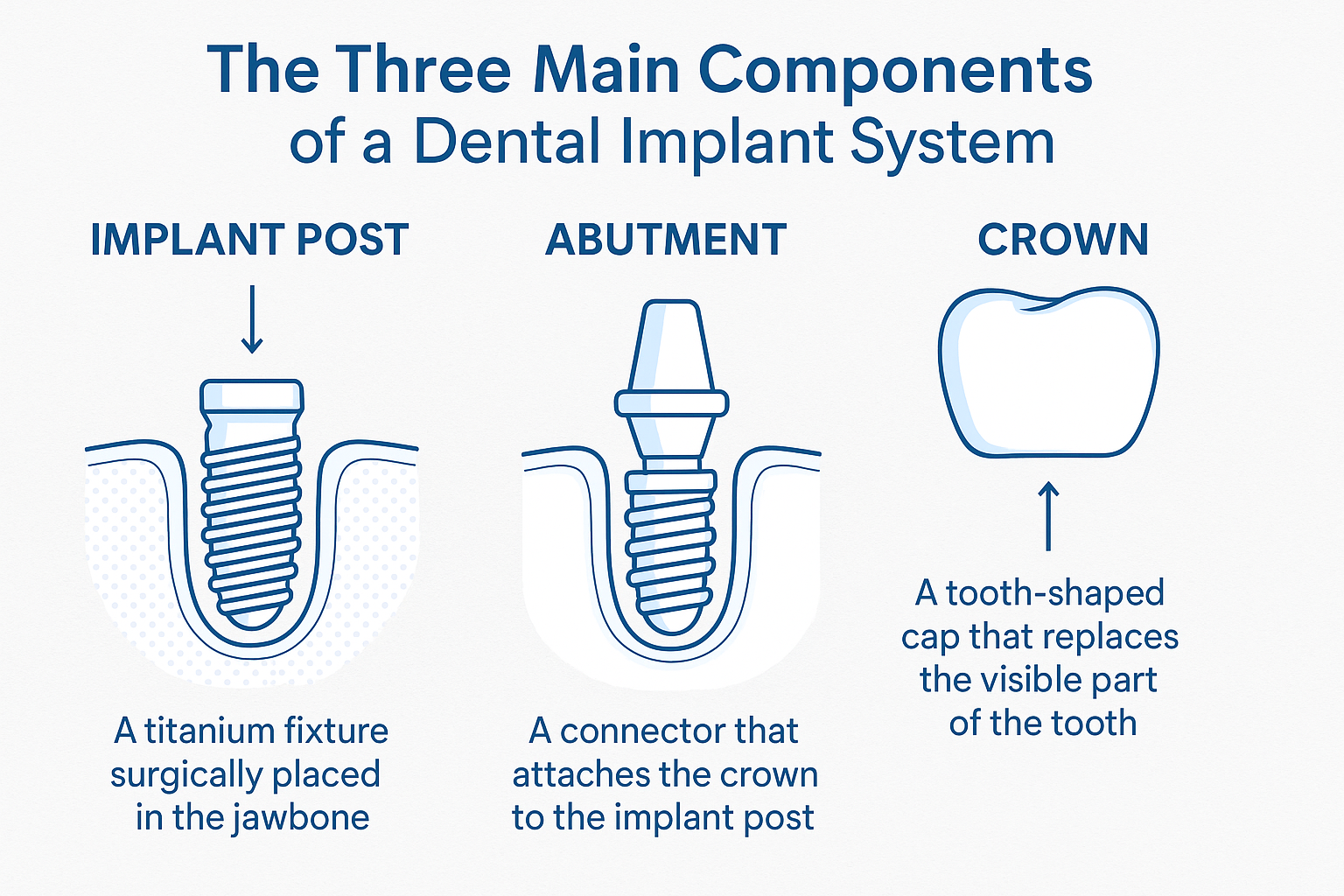
Crown and Abutment Repairs
The most common implant repair involves the crown or abutment rather than the actual implant. These repairs are typically straightforward and cost-effective:
Crown Replacement
- Damaged or worn crowns can be replaced without affecting the implant
- New crowns are custom-made in a dental lab to match your natural teeth
- The procedure usually takes 2-3 weeks from impression to placement
Abutment Issues
- Loose or broken abutments require professional attention
- A loose implant post may indicate abutment problems
- Most abutment issues can be resolved in a single visit
Soft Tissue Management
Issues with the gum tissue around the implant require specialized care:
- Peri-implantitis – Infection around the implant requiring deep cleaning
- Gum recession – May need soft tissue grafting
- Inflammation – Often managed with improved oral hygiene and professional cleaning
When Dental Implant Replacement Becomes Necessary
Complete Implant Failure
Sometimes, complications develop with the dental implant itself, requiring complete replacement:
Osseointegration Failure
- The implant fails to properly fuse with the jawbone
- More common in the first few months after implant placement
- Requires removing the current implant and starting over
Severe Bone Loss
- Bone loss around the implant can compromise stability
- May require bone graft procedures before new implant placement
- Advanced cases might need more complex restoration procedures
Fractured Implants
- Though rare, fractured dental implant posts require complete replacement
- Usually caused by excessive force or manufacturing defects
- The broken implant post must be carefully removed
Factors That Increase Risk of Implant Failure
Understanding these risk factors helps prevent future problems:
- Poor oral hygiene 🦷
- Smoking or tobacco use 🚭
- Uncontrolled diabetes
- Teeth grinding (bruxism)
- Improper implant placement
- Insufficient bone density
The Dental Implant Restoration Process in New Jersey
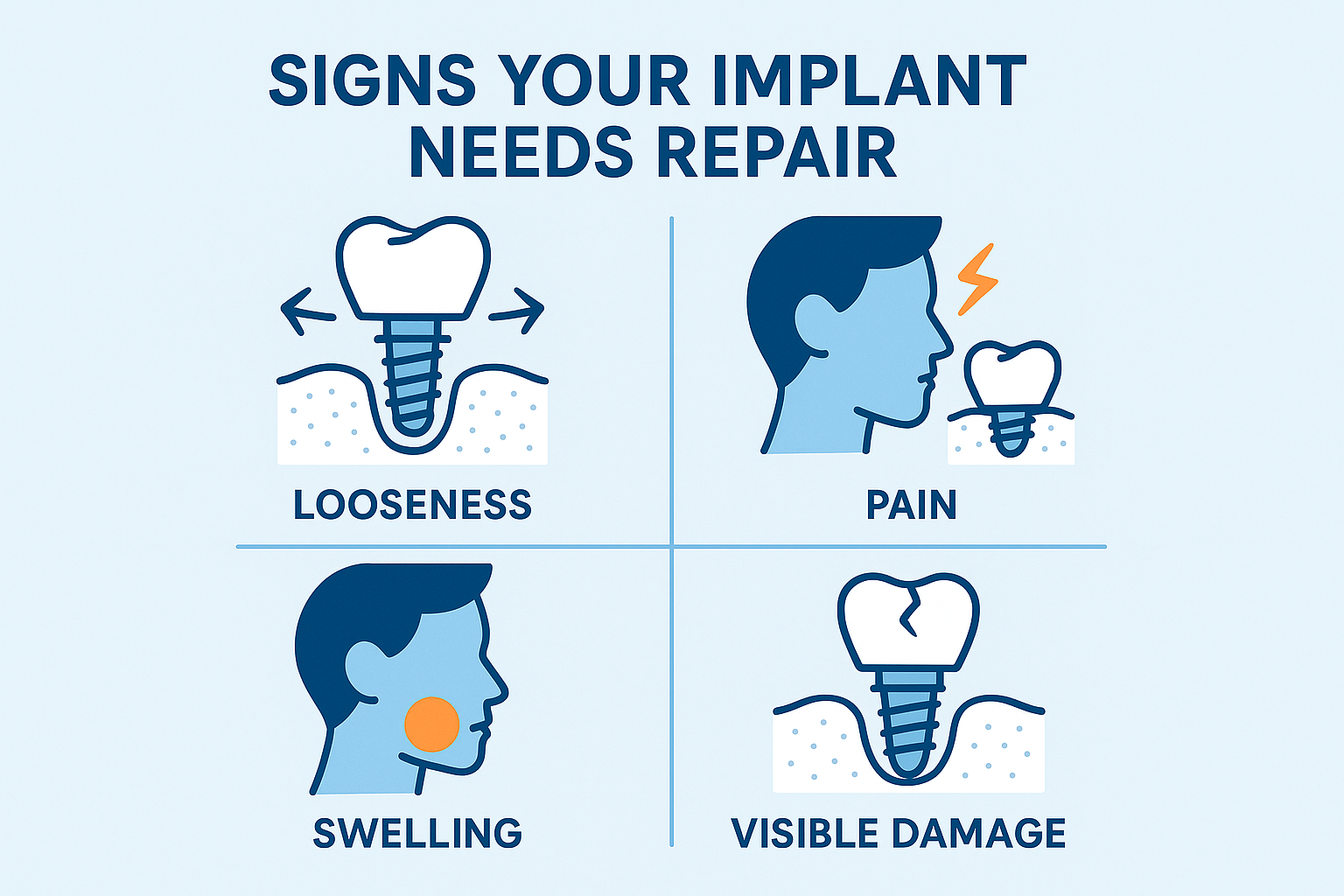
Initial Assessment and Diagnosis
When you visit a dentist for dental implant repairs NJ, the process typically begins with:
- Comprehensive Examination 🔍
- Visual inspection of the implant and surrounding tissues
- X-rays or CT scans to assess bone levels
- Evaluation of the implant’s stability
- Treatment Planning
- Determining the best approach for your specific situation
- Discussing timeline and cost considerations
- Exploring alternative options if needed
Common Repair Procedures
Crown and Restoration Repairs Most dental implant restoration procedures focus on the visible components:
- Simple Crown Replacement: When the crown is damaged but the implant and abutment are stable
- Abutment Adjustment: Modifying or replacing the connector piece
- Screw-retained or cement-retained restoration options depending on your case
Soft Tissue Procedures
- Professional cleaning around the implant
- Antibiotic therapy for infections
- Soft tissue grafting for gum recession
Complex Reconstructive Work
- Bone graft procedures to rebuild lost bone
- Sinus lift procedures for upper jaw implants
- Complete implant removal and replacement
Recovery and Aftercare
Following an implant restoration, proper care is essential:
- Immediate post-procedure care (first 24-48 hours)
- Oral hygiene modifications during healing
- Follow-up appointments to monitor progress
- Long-term maintenance strategies
Choosing the Right Specialist for Dental Implant Repairs NJ
Qualifications to Look For
When selecting a provider for dental implant repairs NJ, consider these credentials:
Educational Background
- Advanced training in implant dentistry
- Continuing education in restoration techniques
- Board certifications in relevant specialties
Experience Factors
- Years of experience with implant procedures
- Number of implant restorations performed annually
- Success rates and patient testimonials
Similar to choosing a dental implant dentist, finding the right specialist for repairs requires careful consideration of their expertise and track record.
Questions to Ask Your Dentist
Before proceeding with treatment, ask these important questions:
- What exactly is wrong with my implant?
- What are my treatment options?
- How long will the repair take?
- What is the expected success rate?
- What happens if the repair doesn’t work?
Technology and Techniques
Modern implant restoration services utilize advanced technology:
- 3D imaging for precise diagnosis
- Computer-guided surgery for accurate placement
- Digital impressions for better-fitting restorations
- CAD/CAM technology for same-day crowns
Cost Considerations for Dental Implant Repairs in NJ
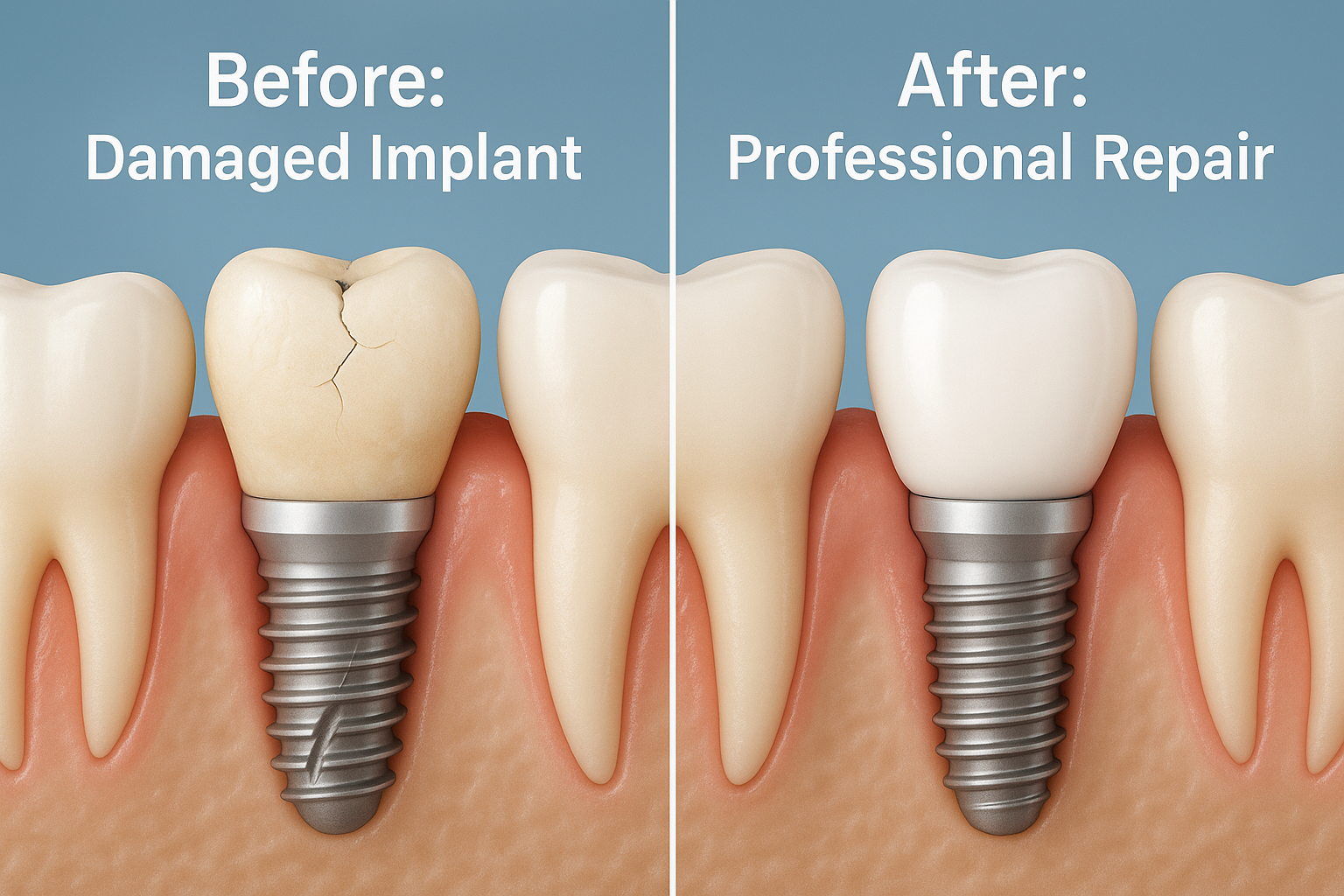
Factors Affecting Repair Costs
The cost of dental implant repairs NJ varies based on several factors:
Type of Repair Needed
- Crown replacement: $800-$1,500
- Abutment repair: $300-$800
- Complete implant replacement: $3,000-$6,000
- Bone grafting procedures: $500-$2,000
Complexity Factors
- Extent of damage or infection
- Need for additional procedures
- Time required for healing
- Type of dental implant system used
Understanding these factors affecting implant cost can help you budget appropriately for your repair needs.
Insurance and Payment Options
Insurance Coverage
- Most dental insurance plans provide some coverage for implant repairs
- Medical insurance may cover repairs due to trauma or medical conditions
- Coverage varies significantly between plans
Financing Solutions Many NJ dental practices offer payment plans for implants and repairs:
- In-house financing programs
- Third-party healthcare credit options
- Flexible payment arrangements
- Seasonal promotions and discounts
Prevention: Protecting Your Implant Investment
Daily Oral Hygiene for Implants
Proper care can prevent many issues that require dental implant repair:
Essential Daily Habits 🦷
- Brush twice daily with a soft-bristled toothbrush
- Use antimicrobial toothpaste designed for implants
- Floss daily with implant-specific floss or water flossers
- Rinse with antibacterial mouthwash
Tools and Techniques
- Interdental brushes for cleaning around implants
- Water flossers for gentle yet effective cleaning
- Regular replacement of toothbrushes and floss
Professional Maintenance
Regular dental visits are crucial for implant longevity:
- Professional cleanings every 3-6 months
- Implant-specific maintenance procedures
- Early detection of potential problems
- Adjustment of restorations as needed
Lifestyle Factors
Certain habits can significantly impact implant success:
Habits to Avoid ❌
- Smoking or tobacco use
- Excessive alcohol consumption
- Teeth grinding or clenching
- Using teeth as tools
Protective Measures ✅
- Night guards for bruxism
- Sports guards for athletic activities
- Regular exercise and healthy diet
- Stress management techniques
Advanced Implant Restoration Techniques
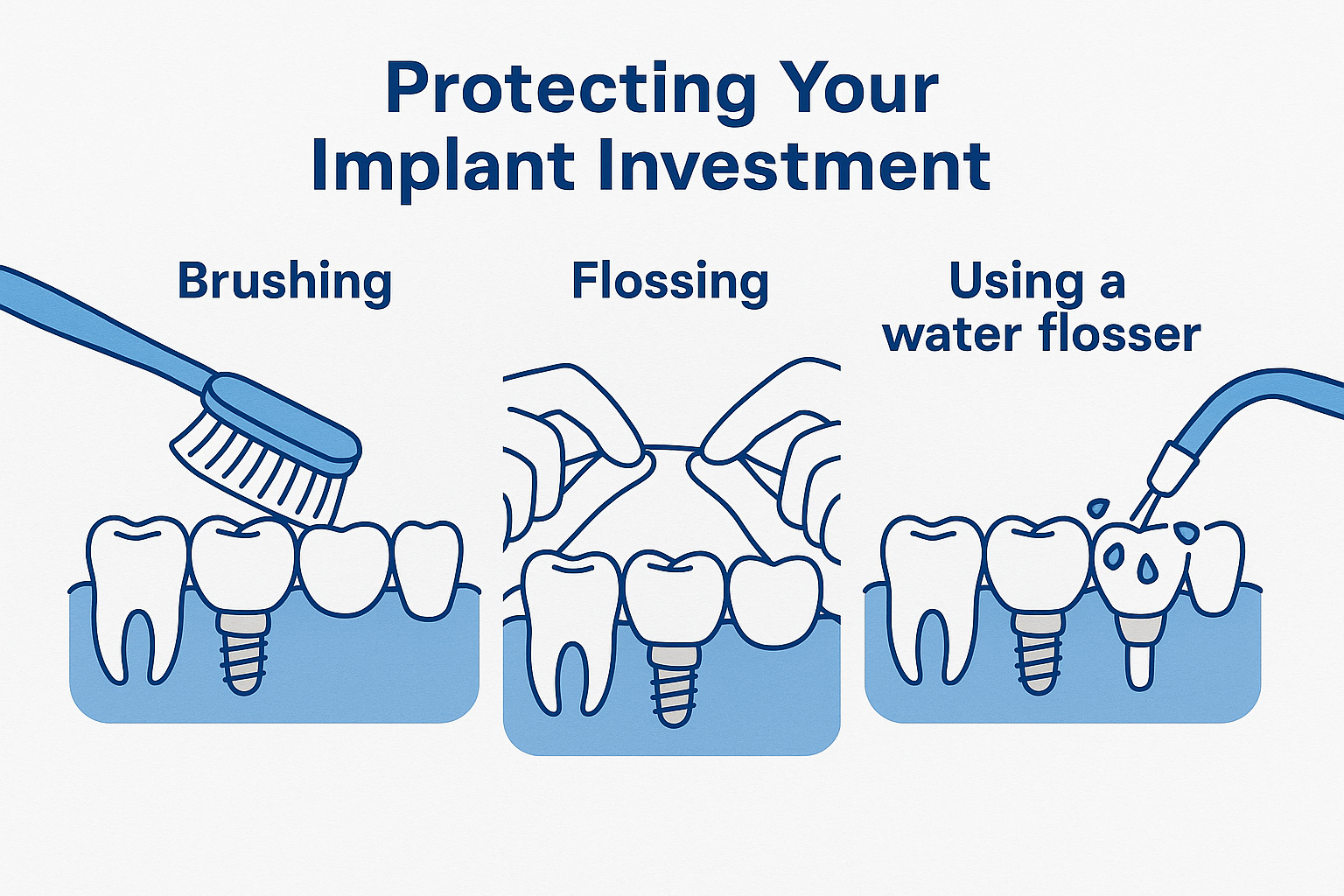
Digital Dentistry in Implant Repair
Modern dental implant restoration benefits from cutting-edge technology:
Digital Workflow Advantages
- More accurate impressions and measurements
- Faster turnaround times for restorations
- Better communication with dental lab technicians
- Improved patient comfort during procedures
3D Printing and CAD/CAM
- Custom abutments designed specifically for your case
- Same-day crown fabrication in some situations
- Precise surgical guides for complex repairs
- Better aesthetic outcomes
Minimally Invasive Approaches
Recent advances focus on preserving healthy tissue:
- Flapless surgery techniques when possible
- Laser therapy for soft tissue management
- Piezoelectric surgery for precise bone work
- Growth factors to enhance healing
Understanding Dental Implant Terminology for Better Communication
Key Terms for Patients
Understanding dental implant terminology helps you communicate effectively with your dentist:
Basic Components
- Osseointegration: The process of implant fusion with bone
- Peri-implantitis: Infection around the implant
- Abutment: Connector between implant and crown
- Prosthetic: The artificial tooth or teeth
Procedure Terms
- Immediate loading: Placing a temporary crown right after implant placement
- Staged approach: Multiple appointments for complete treatment
- Bone grafting: Adding bone material to support the implant
- Sinus lift: Procedure to add bone in the upper jaw
Treatment Planning Vocabulary
Assessment Terms
- Bone density: Quality and quantity of jawbone
- Soft tissue biotype: Characteristics of your gum tissue
- Occlusion: How your teeth come together when biting
- Esthetics: Appearance and cosmetic considerations
Regional Considerations for NJ Patients
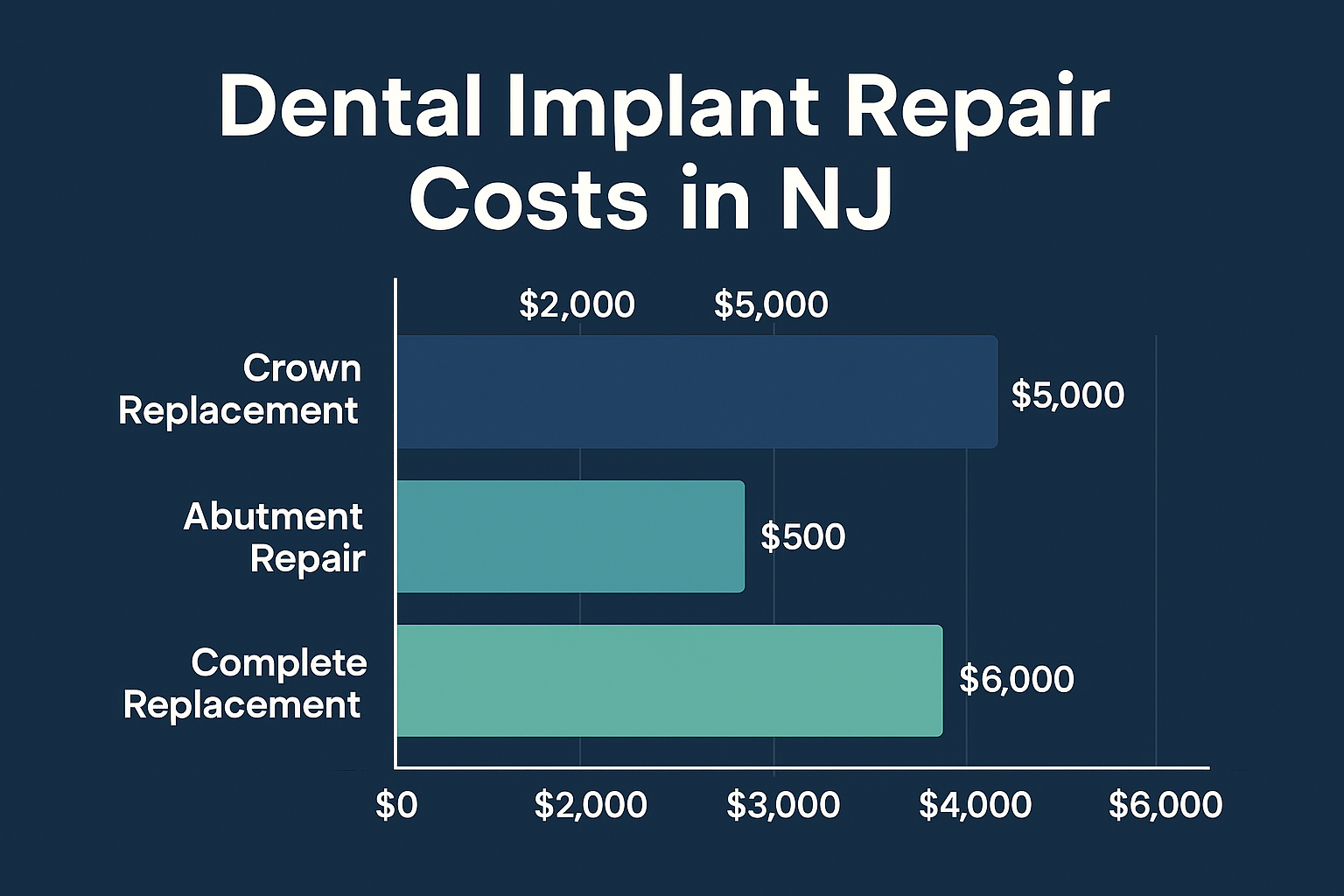
Finding Quality Care in New Jersey
New Jersey offers excellent options for dental implant repairs NJ:
Major Metropolitan Areas
- Newark and surrounding areas
- Jersey City and Hudson County
- Princeton and central New Jersey
- Atlantic City and southern regions
Rural and Suburban Options
- Many qualified practitioners throughout the state
- Traveling to specialists may be worthwhile for complex cases
- Telemedicine consultations available for initial assessments
State-Specific Regulations and Standards
Licensing Requirements
- All dentists must be licensed by the New Jersey State Board of Dentistry
- Specialists require additional certifications
- Continuing education requirements ensure current knowledge
Patient Rights
- Right to informed consent
- Access to treatment records
- Second opinion options
- Complaint resolution procedures
When to Seek Emergency Implant Care
Urgent Situations Requiring Immediate Attention
Some implant problems require emergency care:
True Emergencies 🚨
- Severe pain or swelling
- Signs of serious infection (fever, facial swelling)
- Trauma causing implant displacement
- Bleeding that won’t stop
Urgent but Non-Emergency
- Loose or damaged crown
- Minor pain or discomfort
- Food impaction around implant
- Aesthetic concerns before important events
Managing Implant Problems at Home
While waiting for professional care:
Pain Management
- Over-the-counter pain relievers as directed
- Cold compress for swelling
- Saltwater rinses for minor irritation
- Avoid chewing on the affected side
When NOT to Wait
- Never ignore persistent pain
- Don’t attempt to repair loose components yourself
- Avoid using temporary dental adhesives on implants
- Seek immediate care for signs of infection
Long-Term Success and Maintenance
What to Expect After Repair
Following successful dental implant restoration:
Short-term Recovery (1-2 weeks)
- Some discomfort and swelling is normal
- Gradual return to normal eating habits
- Follow all post-operative instructions
- Attend all scheduled follow-up appointments
Long-term Outlook (months to years)
- Most repairs are successful when properly maintained
- Regular monitoring prevents future problems
- Proper care can extend implant life significantly
- Some patients may need additional maintenance over time
Maximizing Your Investment
To get the most from your dental implant repair:
Immediate Steps
- Follow all post-treatment instructions carefully
- Maintain excellent oral hygiene
- Attend all follow-up appointments
- Report any concerns promptly
Long-term Strategies
- Develop a relationship with a trusted implant specialist
- Stay current with recommended maintenance schedules
- Address problems early before they become serious
- Consider preventive treatments when recommended
Conclusion: Taking Action for Your Implant Health
Dealing with dental implant problems can feel overwhelming, but understanding your options for dental implant repairs NJ empowers you to make informed decisions about your oral health. Whether you’re facing a simple crown replacement or a more complex restoration procedure, the key is to act promptly and work with qualified professionals.
Remember that most implant issues are repairable when caught early. The investment you made in your original implants doesn’t have to be lost – with proper care and timely intervention, your implants can continue serving you well for many years to come.
Your Next Steps:
- Schedule a consultation with a qualified implant specialist in New Jersey if you’re experiencing any implant-related concerns
- Don’t delay treatment – early intervention is almost always more successful and cost-effective
- Ask questions about your specific situation and treatment options
- Consider prevention strategies to protect your remaining implants
- Explore financing options if cost is a concern – many practices offer flexible payment plans
If you’re dealing with implant issues, you’re not alone, and you have options. Take the first step by contacting a qualified dental implant restoration specialist in New Jersey today. Your smile – and your confidence – are worth the investment in proper care.
For those considering new implants or looking to understand more about implant costs, explore affordable dental implants options and learn about ways to save money on dental implants to make informed decisions about your dental care.

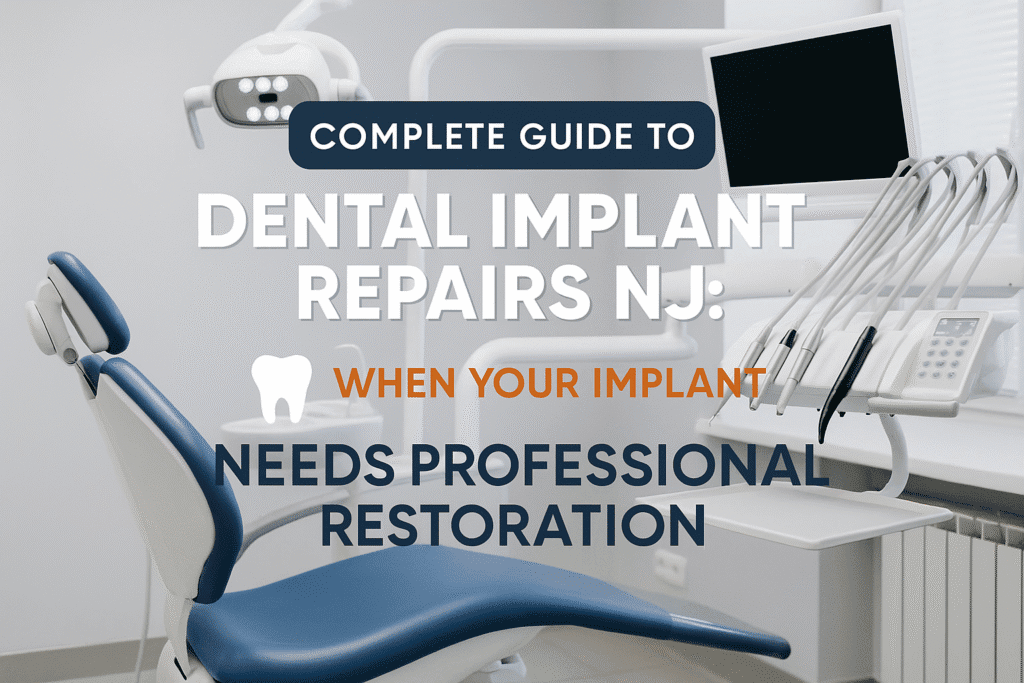
Leave a Reply
Share your thoughts or ask a question about dental implants. Your email address will not be published.